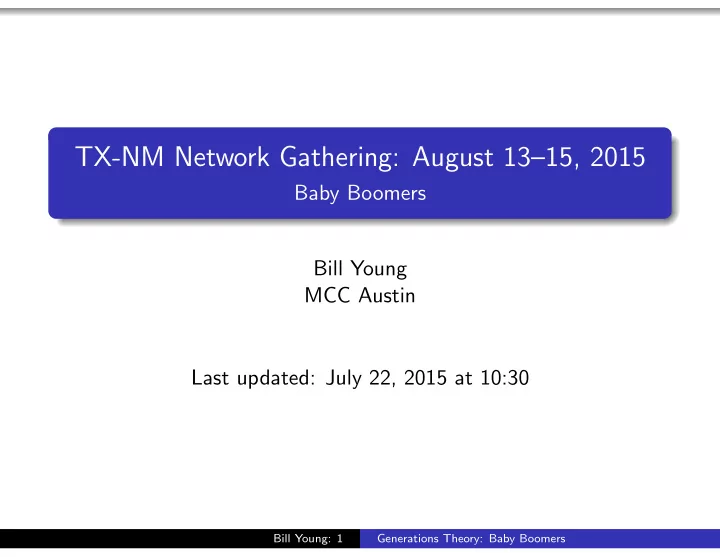

TX-NM Network Gathering: August 13–15, 2015 Baby Boomers Bill Young MCC Austin Last updated: July 22, 2015 at 10:30 Bill Young: 1 Generations Theory: Baby Boomers
Baby Boomers (b. 1943–1960) Post-WWII population increase led to a “pig in the python” phenomena, a large cohort of folks aging together. Some characterize the boom from 1945–1964. What events do you think shaped the Boomer worldview? Bill Young: 2 Generations Theory: Baby Boomers
Baby Boomers (b. 1943–1960) Wealthiest, most active, most fit generation to that time Often associated with rejection or redefinition of traditional values Grew up in a time of government subsidies in housing and education Generally optimistic about the future Increased consumerism has been criticized as excessive Tend to think of themselves as a special generation distinct from predecessors Boomers are more ethnically and economically diverse and generally better-educated than the previous two generations. Bill Young: 3 Generations Theory: Baby Boomers
Two Cohorts? Some have broken the Baby Boomers into two distinctive groups: The Leading Edge (b. 1943–1954) The Trailing Edge (b. 1954–1960) The events that separate them are the end of the Vietnam War, the draft, Watergate, and the end of a decade of prosperity. Bill Young: 4 Generations Theory: Baby Boomers
Leading Edge Boomers (b. 1943–1954) Some say they were catered to in youth and consider themselves “special” Reacted by pushing against authority, challenging the establishment, championing causes, focusing on themselves Generally optimistic and individualistic Seek a sense of purpose, connection, opportunities to learn, ways to stay vital and healthy Bill Young: 5 Generations Theory: Baby Boomers
Leading Edge Boomers (b. 1943–1952) Many leading edge boomers define themselves by their jobs and achievements. Many don’t plan to retire completely, to maintain sense of identity and enjoy social interaction work provides. Retirement is not a single event, but a journey. Will move in and out of work, community involvement, and lifelong learning. Bill Young: 6 Generations Theory: Baby Boomers
Trailing Edge Boomers (b. 1953-1960) Grew up during Watergate and the fall of Saigon. Came of age during a poor economy and rising inflation Less optimistic and more distrustful of gov’t than Rising Edgers Job hopping and career changes common Juggle parenting, careers, time for self Likely to work beyond traditional retirement Many will continue to exhibit individualism and self-indulgence Bill Young: 7 Generations Theory: Baby Boomers
Generation Jones Generation Jones is sometimes used to distinguish those born from 1954–1965. Coined by author Jonathan Pontell Spans end of Boomer generation and start of Gen X. May refer to: a largely anonymous generation “keeping up with the Joneses” competitiveness “jonesing,” meaning yearning or craving Bill Young: 8 Generations Theory: Baby Boomers
Generation Jones given high expectations but confronted with different reality as came of age to high unemployment and de-industrialization fewer resources and privilege than preceding Boomers less optimistic, distrust government, general cynicism Bill Young: 9 Generations Theory: Baby Boomers
Boomers Volunteer Boomers currently have a high volunteer rate and volunteer at higher rates than past generations did at the same age. Age Range Percentage Volunteering 16–24 years 21.9% 25–34 years 22.0% 35–44 years 29.8% 45–54 years 28.5% 55–64 years 25.9% 65+ years 23.6% Boomers care to leave a legacy and see the post-mid-life years as a time of contribution, connection, and continued learning. Choice and control over what they do and how they do it are key!! Bill Young: 10 Generations Theory: Baby Boomers
Using Generation Theory Recall that Boomers are an Idealist generation. Idealists are more interested in individuals and values than in institutions and traditions. Idealists and visionaries, better poets than engineers. Identify comes from within. Individuality is more important than fitting in. Have distate for institutions in general. What are the implications for the church? Bill Young: 11 Generations Theory: Baby Boomers
Engaging Boomers As previous generations aged out of volunteer roles, Boomers stepped in. But required a paradigm shift. Old Paradigm New Paradigm Civic duty, obligation, Personal fulfillment, Motivation religious commitment improve the world, entry to new career, religious commitment Direct / indirect Bigger variety of roles Preferred client service and including management, Service Roles organizational support professional services Volunteer on regular Menu of options, Pattern of Service basis flexibility (from the Intergenerational Center at Temple University) Bill Young: 12 Generations Theory: Baby Boomers
Engaging Boomers Old Paradigm New Paradigm Low expectation of Range of incentives Incentives compensation including learning and career opportunities Close supervision, Collaboration, treated Preferred top down management as partners, focus on mgmt style team building Organization-defined Balance between Job design roles; priority on organizational and organizational needs individual needs/interests Bill Young: 13 Generations Theory: Baby Boomers
Giving and Boomers Because of their life experiences: Money is a tool. Grew up relative affluence and an expanding economy. Success is our children having more than we had. Credit encouraged a buy-now, pay-later ethos. Giving is a personal option. Hold little institutional loyalty. Give to support the mission, not preserve the institution. Boomers won’t give money just “to keep the lights on.” Mission must follow money, not the other way around! Do you think that MCC Boomers are any different than mainline Boomers in these aspects? Bill Young: 14 Generations Theory: Baby Boomers
Exercise Gather again into groups at your table. Within your group answer attempt to compose a stewardship letter aimed at the Baby Boom members of your congregation. 1 What sorts of things are likely to motivate these givers? 2 What don’t they want to hear? 3 How does this letter differ than the one you wrote for the older generations? 4 Suppose they found out that you are crafting a letter specifically for them. Do you think they’d feel that this is manipulative? Do you think so? Bill Young: 15 Generations Theory: Baby Boomers
Recommend
More recommend